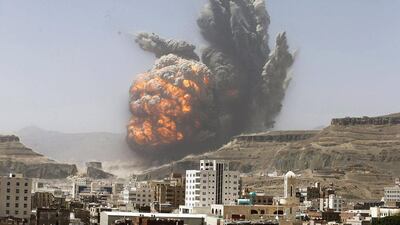SANAA // Saudi-led air strikes on weapons caches in Yemen’s rebel-held capital on Monday caused massive explosions that shattered windows, sent residents scrambling for shelter and killed a local TV presenter.
A TV station run by the rebels in Sanaa said 15 people were killed and dozens wounded in the bombing but those figures could not immediately be confirmed.
The explosions were the most powerful seen in the city since a Saudi-led air campaign against Iran-allied Shiite rebels, known as Houthis, began last month. The blasts deposited a layer of soot on the top floors of residential buildings in Sanaa and left the streets littered with glass. Anti-aircraft fire rattled across the city in response.
Mushroom clouds rose over Fag Atan, in the mountainous outskirts of Sanaa, where the capital’s largest weapons caches are located. The site has been targeted several times in the Saudi-led air campaign, now in its fourth week.
A Yemeni official said the Saudi-led warplanes are demolishing parts of the mountain, hoping to uncover and destroy Scud missiles.
Some 6 kilometres away from Fag Atan, cars were damaged and charred, shop fronts were shattered and the windows were blown out of office buildings.
The Houthis’ TV network Al Masirah said that 15 died and that Mohammed Shamsan, a TV presenter for another network, was among those killed. It said members of his crew were wounded. Ambulances were rushing to the site of the explosions, and Al Masirah aired a statement by health authorities calling on citizens to donate blood.
Residents posted videos and pictures of the explosions, and the damage they had caused, on social media.
“The hanging ceiling and chandelier fell because of the explosions,” resident Mohammed Mohsen said.
Saudi Arabia and several of its allies, mainly Gulf Arab countries, launched the air strikes on March 26, hoping to roll back the rebels, who seized Sanaa in September and have overrun large parts of the country with the help of security forces loyal to former president Ali Abdullah Saleh.
Western governments and Sunni Arab countries say the Houthis get arms from Iran. Tehran and the rebels deny that, though the Islamic Republic has provided political and humanitarian support to the group.
On Monday, Iranian state TV said an air raid by the Saudi-led coalition has hit close to the Iranian embassy in Sanaa, shattering windows but causing no casualties or injuries.
The report says Iran’s foreign ministry summoned the kingdom’s envoy to Tehran to protest over the bombing.
Fighting intensified in the southern port city of Aden, where the Houthis and Saleh loyalists are battling youth militias and forces loyal to president Abdrabu Mansur Hadi, who fled the country last month in the face of the Houthi advance.
The Houthis and their allies have been trying to take over Aden for weeks. On Monday, heavy fighting erupted near the airport and in the central Al Arish district between the rebels and local armed groups formed by residents to defend their neighbourhoods, witnesses said.
Air strikes targeted a hotel in Aden suspected of being used by the Houthis and allied forces. There was no word on casualties.
In remarks published in his newspaper Yemen Today, the ousted Mr Saleh denied striking an alliance with the Houthis or that the rebels are in full control of the army.
“We discussed the alliance after the Saudi assault on our country, and it has not materialised so far,” Mr Saleh said.
He also pledged to “be positive” in dealing with a UN security council resolution adopted last Tuesday calling on Yemen’s rivals to end the violence and return to UN-led peace talks.
The security council resolution makes no mention of the Saudi-led air strikes but imposes an arms embargo on three leaders of the Shiite rebel group, as well as on Mr Saleh and his son. It also demands that the Houthis withdraw from areas they have seized, including Sanaa, and relinquish arms and missiles seized from military and security institutions.
Meanwhile, a Saudi soldier has been killed in a barrage of mortar and other fire along the border with Yemen, the interior ministry said on Monday.
The soldier is the eighth to die since warplanes from the Saudi-led coalition on March 26 began air strikes in Yemen.
* Associated Press, Agence France-Presse

